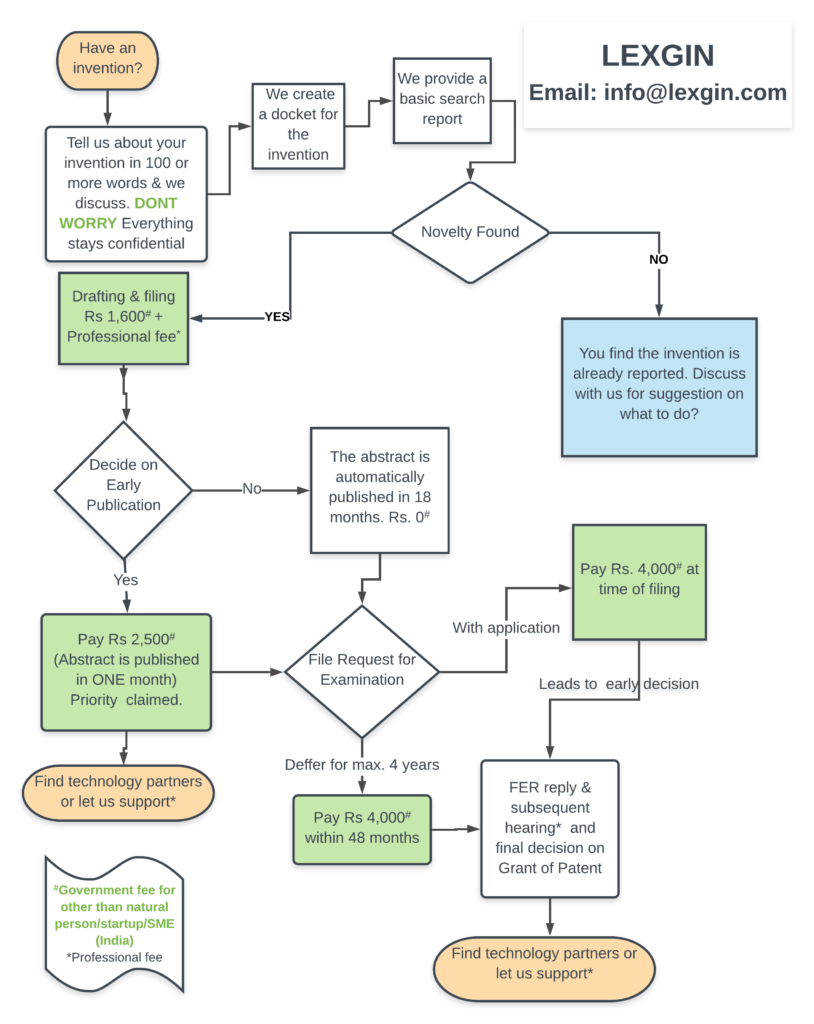Patent Filing Process in India – The Patent Process in India though being similar to that globally still is different, let’s see how the patent filing in India is done.
1. Patent Searching
As the name suggests it is a search much like google search, with proper keywords and their combinations to find the most relevant prior literature. This is obviously done the inventors, but patent agents are a little more adept to using keyword combinations. (professional fee may apply).
2. Patent drafting
Patent is a technical but also a legal document. Almost a large part of the patent application can be successfully be drafted by the inventor, however it is always recommended to take the patent agent into loop as it is not possible to add on the things later on which were not included in the initial application. A week application tends to fail at a later stage and does not get collaborators. A professional fee may apply at this stage which varies widely based on the complexity of the invention and quality of content provided by the inventor. Information received as per the inhouse template of patent agent significantly reduces the processing time & thereby the cost to the inventor. Feel free to ask for a copy of template at no cost.
3. Patent filing
This is like filling up the forms, the most common ones are Form no. 1, 2, 3, 5, 9 & 18. It can be done online with digital signature or offline. Offline submission is priced 10% more. Online filing has a built-in check, hard copy submissions are checked at deposit counter. This process requires an official fee.
4. Patent publication
Once the application is successfully filed, the inventor gets rights over the patent, but still legally he is not able to stop others from manufacturing or selling his invention unless it is officially made public. This process is call Patent publication. It happens automatically at 18 months (for no fees) unless the inventor wants to have it published in 1 month (requires an official fee).
5. Patent Examination
The patent will be granted only when it is found appropriate. Patent are thus needed to be examined & it is done only on request. It can be done anytime after the application is filed (step 3) but not later than 48 months from date of step 3. There is an official fee for it.
6. Replying to Examination report
There is hardly any patent application that goes through without queries from patent office. So the inventor needs to be prepared to reply to the same. The technical inputs are by the inventor & the legal inputs are provided by the patent agent for a preparing a well drafted response (a professional fee may apply).
7. Patent hearing
If the decision of the examiner is still towards negative relating to grant of patent, he/she may allow you to appear in a face to face meeting. This is either online or at the patent office. (a professional fee may apply)
8. Replying to Examiner queries
Once the meeting is successful, the required details are to be prepared and submitted to the patent office for a positive decision in favor of the inventor.
Patents agents are people with knowledge about the nitty gritty of the legal framework, they help you navigate through the water much more easily & handle a lot of techno-legal and a certain mundane tasks of filing, they are still not a guarantee to grant of patent. The grant of patent depends largely on the novelty of the inventors work, the strength of the granted patent however largely depends on the patent agent. Patent agents are your partners who help your inventions take a step further towards seeing the light to commercial success.

